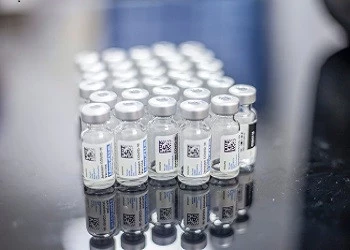As cholera cases surge, key vaccine manufacturer to stop production
As cases of cholera rise around the world, Shantha Biotechnics has announced it will stop production of its cholera vaccine at the end of 2022
Add bookmark
Shantha Biotechnics, an Indian subsidiary of Sanofi, has announced it will stop production of its cholera vaccine Shanchol at the end of this year.
There are currently only three oral cholera vaccines approved for use by the World Health Organization (WHO), of which only two – Shanchol and Euvichol, produced by EuBiologics, are available for mass vaccination campaigns. These campaigns enable large quantities of the vaccine to be stockpiled in areas experiencing a cholera outbreak, areas that may be particularly vulnerable to an outbreak during a humanitarian crisis, and among populations living in places where the disease is endemic.
Shanchol is unique in that it is prequalified to be used in a controlled temperature chain, allowing the vaccines to be kept at temperatures outside of the traditional cold chain of +2°C to +8°C for a limited period of time under monitored conditions.
Cholera on the rise around the world
The announcement follows reports of the disease surging around the world. Syria has been experiencing a major cholera outbreak since September, first linked to contaminated water near the Euphrates River and the severe water shortage in the north of the country. It has since spread across Syria, with Medecins Sans Frontières estimating more than 13,000 suspected cases and 60 deaths.
Neighbouring Lebanon has announced its first death from cholera since detecting the disease in October, claiming it has crossed the border from Syria and is now spreading around the country.
Health authorities in the Bahamas have confirmed the country’s first case of cholera since 2017, while doctors in the US fear shortages of a vaccine if the disease spreads within its borders.
It is perhaps in Haiti where the cholera surge is being felt the most acutely, with Unicef labeling it “close to a death sentence” for children. Here the disease is making a return after the 2010 outbreak that caused the deaths of 10,000 people. A major factor is the fuel crisis that has gripped the country and stopped the production of bottled water as suppliers have run out of diesel fuel.
A serious threat to public health
WHO estimates that each year there are up to four million cases and 143,000 deaths worldwide caused by cholera. The illness occurs after consuming food or water that is contaminated with bacteria and can cause severe diarrhoea and dehydration. While it can take between 12 hours and five days for a person to show symptoms, it can be fatal within hours if left untreated.
Modern sewage and water treatment facilities have eradicated cholera in many countries, but it is still a significant threat to public health in regions where there is little access to clean water. Areas affected by poverty, war and natural disasters are particularly at risk.
WHO recommends the use of vaccines to treat cholera, rather than antibiotics that have no proven effect on the spread of cholera and may contribute to antimicrobial resistance.
A spokesperson for Shantha Biotechnics has said that the decision to stop production was taken in 2020. “We took this decision in a context where we were already producing very small volumes versus the total demand for cholera vaccines and in the knowledge that other cholera vaccine manufacturers (current and new entrants) had already announced an increased supply capacity in the years to come,” they said.
The need to increase vaccine production
At a press conference on October 6, WHO Director-General Dr Tedros Adhanom Ghebreyesus said that cholera was making “an unwelcome comeback.” He stated, “In the first nine months of this year alone, 27 countries have reported cholera outbreaks. Not only are we seeing more outbreaks but more deadly outbreaks. The data we have, which are limited, show the average case fatality rate so far this year is almost three times the rate of the past five years. In Syria, more than 10,000 suspected cases of cholera have been reported just in the past six weeks.”
He continued, “In Haiti, after more than three years with no cases of cholera, two cases have been officially reported this week in the capital Port-au-Prince, with 20 suspected cases and seven deaths under investigation in other areas. It’s likely the actual number of cases is significantly higher. This outbreak is a particular setback as Haiti was preparing to be certified as cholera-free later this year.”
Ghebreyesus added that cholera thrives on poverty and conflict, and transmission is being exacerbated by climate change and extreme weather events that reduce access to clean water.
WHO and its partners created an international stockpile of cholera vaccines that shipped 27 million doses in 2021, “but, with an increasing number of outbreaks, supply cannot keep up with demand,” Ghebreyesus said. “We urge the world’s leading vaccine manufacturers to talk to us about how we can increase production.”
Quick links
- Pfizer to supply all its medicines to low-income countries for no profit
- WHO issues warning over cough syrup after child deaths in Gambia
- Three ways drones are supporting pharma supply chains
Get exclusive access to member-only articles, reports, videos, interviews, webinars and other premium content from industry experts and thought leaders by signing up to Pharma Logistics IQ here.















